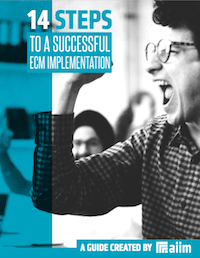The AIIM Blog
Keep your finger on the pulse of Intelligent Information Management with industry news, trends, and best practices.
As an information management professional, I've observed a concerning trend in the rush to adopt artificial intelligence (AI) technologies, particularly when the stakes are high. There's a significant disconnect between the allure of these powerful AI tools and the reality of most organizations' data readiness. This disconnect, which I call the "data delusion," poses significant challenges for successful AI implementation, especially in critical decision-making scenarios.
Share
Artificial Intelligence (AI) | Process Automation
On October 1, 2024, at the AIIM Information and Data Leadership Symposium in Arlington, VA, I had an enlightening conversation with Alan Pelz-Sharpe, Founder of Deep Analysis. Our discussion centered on a crucial question: What should your organization's information management technology stack look like in 2025 to maximize the benefits of AI and process automation?
Share

Making an ECM implementation successful requires planning and attention to detail. The best way to create the right solution is to identify organizational goals and priorities. Learn how to manage a successful implementation in our free guide.
Artificial Intelligence (AI) | Compliance | Information Governance
At a recent industry panel, Bill Murphy, Chief Executive Officer of RedZone Technologies, moderated a discussion featuring three distinguished information management experts: Reggie Henry, CAE, Chief Information & Performance Excellence Officer, American Society of Association Executives (ASAE) Candace McCabe, CIP, Sr. Solution Architect - Governance, Risk, and Compliance, Walmart Mark Patrick, CIP, Records Officer, US Department of Defense The panel was part of the AIIM Information and Data Leadership Symposium on October 1, 2024 in Arlington, VA and explored crucial topics in information management, from the value of data to the challenges of innovation. Here are my key takeaways:
Share
AIIM on Air | Artificial Intelligence (AI)
As the potential of Generative AI (Gen AI) continues to unfold, one resounding theme emerges: better AI starts with better information management. The ability of Gen AI to deliver reliable and valuable outputs is directly contingent upon the quality and curation of the underlying data.
Share
As someone who works closely with information management and AI, I get asked a lot whether or not we should trust the outputs from generative AI. I've come to the conclusion that trustworthiness is not a realistic goal when it comes to AI-generated content. Instead, we should approach everything AI produces with a sense of mistrust and use critical analysis skills in how we approach generative AI output.
Share
Why are information management and AI even in the same sentence? It's an interesting question. What's the relationship? Well, the answer is simple: there is no AI without information.
Share